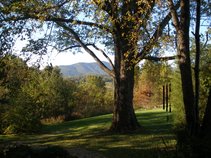
First, the Dalai Lama is the most wonderful person on the planet. His humility, boundless good humor, and charismatic presence is simply beyond compare. We were all assembled (I'm in the second row, just behind Richard Gere who sits in front of me on my right. we're no more than 15 feet from HH) in the big room, thangkas draped on the wall and up to the cavernous ceiling, monks sitting in obeisant attendance at his approach, when he enters with a HUGE smile on his face, bowed with hands clasped and gesturing a welcome to crowd. He kneels down and touches his head on a prayer mat several times while we all remain standing bowing in response, and he takes his sit motioning us all to sit down. From that point, as each scientist presents his research, his facial expressions dance like a diva, from utter penetration on the speaker to uproarious laughter in a deep bass, his eyes tearing up with mirth. At times, the whole room is laughing, and he engages with the monks as though he weren't their leader, and they inch forward as a group to get nearer to him. Their love and respect for him is as strong as his selflessness.
The actual science presented is astounding. We heard about quantum computers, now in development, that will produce solutions about past, present, and future not only with the speed it takes me to write "wow!" but solutions that our present computers could never produce if they had infinity to try. They use Qubits, not bits, and briefly described, that means that instead of using just "0s" and "1s" as do standard computers, they will used "0s" and "1s" that will allow infinite possiblities within each Qubit. Put a few million of those in an entangled grid, create a measuring program that yields a chain reaction of response to reduce infinite probability to a mathematical certainty, and voila, we change the world as we know it and the very definition of interconnectedness and universality.
Next day, we went large. The Big Bang, the meaning of reality, and a lively discussion among the monks, the DL, and the scientists about the various understandings of reality, causation, dependant origination, and the purposes each groups pursue in trying to find the answers; the scientists (pure knowledge) and Buddhism (the cessation of suffering). There was so much more, and I won't bore you with the details, but this particular conference, and the effects it will produce, will likely go down as one of the seminal moments in both human development and the tradition of Tibetan Buddhism. Scholars will look back at this week a hundred years from now as the moment when human development made a, err, quantum leap. In fact, HH said that some day his tradition will look back at the "blond science masters" as a group who turned Buddhism in a new direction.
I also hand-delivered to HH a letter beautifully written to him by Rachel as they were taking me to the airport. She sat in the back seat and hand wrote it in the time it took us to get to the airport. I wouldn't have changed a word. In about four paragraphs she recalled her trip to NY when we saw him in Central Park and at the concert. She told him briefly about her background in a small county in Virginia where fundamentalist Christianity has shaped her friends in some strange ways and how her visit opened her eyes to the beauty of his vision and that it changed her life. When I handed him the letter, he clasped my hands warmly and then took it. I don't know if he will ever read it, if it gets lost between where he was sitting and his private quarter, or what, but the experience of transmitting her message, if only verbally, is all that matters.
Overall, Dharamsala seems so different than the rest of India, certainly Bihar where we were two years ago. Sure, it has its beggars and some of the other problems of the country, but the Tibetans here are as sweet and charming as anyone on Earth. When you pass them, they look you in the eye and wish you "good luck" in their language, and shake your hand. Too bad the rest of the world doesn't learn from their model.
After the meeting, we took a taxi up to the Tibetan Children Village, a 40-acre site draped at the top of another ridge where Tibetan children, some orphans and others who escape surreptiously from Tibet and leave their parents for 10-15 years, receive a first-class education. They live together as "families" of 30-40 children in each house and led by a house mother who cares for them. They take class all day, then join in extra-curricular activities after class. Sports, art and crafts, music lessons, etc. The ages range from infant up to about 20, and a happier, more grounded group of kids you will never see. Certainly not in America. These kids have nothing except their books, their meals, a roof over their head, a dedicated group of teachers, and their adopted "family." Their radiant smiles, friendly greetings, and exuberance put everything in perspective. Nothing matters in life except attitude. Surround a human with love and possibility, and the rest takes care of itself. They will find success and happiness in whatever they do, whatever it may be.
The conference has also talked about brain chemistry, the meta-representational ability of our brains to understand images and concepts, and the evolutionary principle of randomness that multiplies the power of our DNA to produce all the billion of antibodies that keep us alive (and much more). We also went to the Tibetan Institute for the Performing Arts and watched a traditional Tibetan opera; an ensemble of charming and beautiful men and women dressed in traditional garb and dancing and singing their hearts out. It is to describe the poignancy of the Tibetan effort to cling tenaciously to these traditions and keep alive their national identity. They sing their songs, they dance their folk dances, they smile, and they maintain a grace that no amount of persecution can destroy. The world can and must learn from them. If simple morality and ethics isn't enough reason to help Tibet, the example they set for humanity should.
Also, the board of Mind/Life met with His Holiness privately for about 45 minutes and I was there as my bro's representative. We talked about the future of Mind/Life and one thing became abundantly clear: HH looks at this organization and its efforts to promote the benefits of a contemplative approach to every day life as one of his most important secular initiatives. And further, he insists that it not appear as a Buddhist effort but one that transcends, indeed ignores, religious traditions to avoid the trouble and confusion that can (and likely would) cause. His sole interest is to alleviate suffering and he feels that however Buddhist techniques can help modern science do that, he is willing and eager to make the effort. In fact, he expects that within the next 2-3 years, the Tibetan monastic tradition will adopt the study of western science into its curriculum so that they can do an even better job helping the secular world achieve that objective. He is very engaged with this, more so than perhaps any other secular endeavor, and Mind/Life is worthy of his backing.
We closed today. It has been an incredibly deep and learning experience. I can't stress enough the pure joy I experience watching this man. It's hard to explain, but I can't help but get a lump in my throat as I watch him sit on his haunches, shoulders bobbing up and down with mirth, laughing silently and scanning the room with tears in his eyes to make sure that everyone sees and feels the same humor he is experiencing. Can you imagine the paradise this world would be if we had more world leaders like him? Anyway, we had pictures with him, he held my hand and looked deeply into my eyes as he does every person he meets, and then we finished the conference. I'm now at Kashmir Cottage where I have been the last week, filled with emotion and and a sense of timelessness I have never felt before. Leaving tomorrow at 7am for Delhi and Dr. Buxi. Please send my best to everyone who asks and take care. I'll have pix and movies (crazy taxi drives in this community perilously perched on the side of mountains at the foot of the snowy Himalayas).

